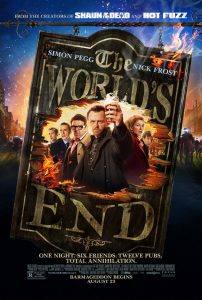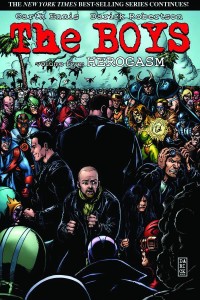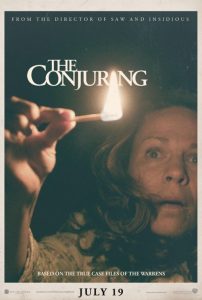 I made the mistake of watching a movie the day before I vanished from the internet for a week and a half, and I made the further mistake of not writing the damned review before said vanishment. So, um, sorry about that.
I made the mistake of watching a movie the day before I vanished from the internet for a week and a half, and I made the further mistake of not writing the damned review before said vanishment. So, um, sorry about that.
On the bright side, the movie I saw was The World’s End, a movie which you no doubt already knew you wanted to see because of its links to the brilliant Shaun of the Dead and the pretty okay Hot Fuzz. The formula is not precisely the same as before, I guess? Where the other two movies were parodies of the zombie and action genre, this is less parody and more mash-up. In the unlikely event that you aren’t spoiled for the mash-up by previews, I will leave out one of the genres, but the other is…. well, okay, hard to qualify. It’s not precisely coming of age, because although Simon Pegg plays an uncomfortably old-looking man-child, all of his friends have clearly grown up[1]. It’s not precisely whatever genre The Big Chill is, if only because the mood isn’t nearly as solemn as all that.
But anyway, whatever it is, it’s funny and well-acted and building towards something meaningful and fellowshippy, when suddenly…. but, y’know, that’s why you should go see it.
On an unrelated note, I am sad that I do not have a bar named The World’s End to go to. And not only because of books Neil Gaiman wrote once upon a time.
[1] If anything, that’s the point.


 In its way,
In its way, 

 A large percentage of the modern horrorscape is devoted to possessions, hauntings, and the intersection between the two. So it makes perfect sense that people would comb through the documented cases of such things and put together a movie around that. After all, nothing adds verisimilitude to a project like slapping “based on a true story” to the tagline.
A large percentage of the modern horrorscape is devoted to possessions, hauntings, and the intersection between the two. So it makes perfect sense that people would comb through the documented cases of such things and put together a movie around that. After all, nothing adds verisimilitude to a project like slapping “based on a true story” to the tagline.

